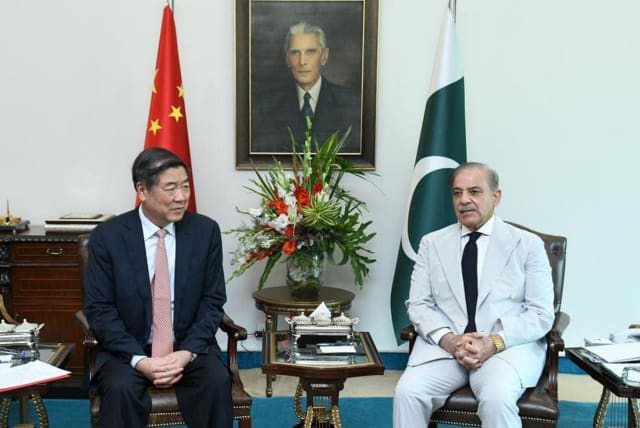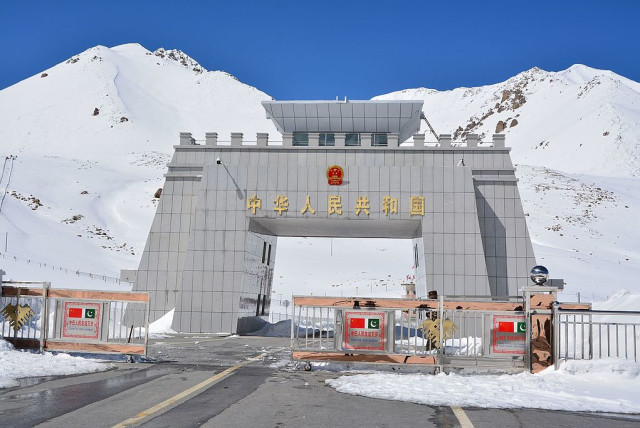China, Pakistan celebrate 10-year economic alliance with renewed pact

Vice Premier He Lifeng's visit to Pakistan underlines ongoing investment and development support, marking a milestone in China-Pakistan relations.
[Islamabad] Chinese Vice Premier He Lifeng arrived in Islamabad on Sunday, kicking off a three-day official state visit to Pakistan to solidify and expand economic cooperation between the countries.
He, who serves as the special envoy of Chinese President Xi Jinping, will attend celebrations marking the 10th anniversary of the China-Pakistan Economic Corridor (CPEC) along with a high-level delegation.
“The visit is a part of regular high-level exchanges and dialogue between the two states, reflecting the importance that Pakistan attributes to China, which had always supported Islamabad’s core strategic interests,” Pakistan’s Foreign Office spokesperson said in a press release. “It underlines the importance of increasing qualitative development and seeking new paths to improve bilateral trade and investment partnerships.”
CPEC, launched in 2013, is a vast infrastructure project including roads, railways, pipelines, and energy facilities estimated at about $62 billion. The project aims to connect the western Chinese city of Kashgar to the Pakistani port of Gwadar on the Arabian Sea, bordering Iran and the Persian Gulf.
CPEC provides Beijing with a shorter and more efficient trade route to the Middle East and Africa. In turn, the project supplies Pakistan with improved connectivity, infrastructure development, and foreign investment, potentially turning the country into a regional economic hub.
“Since the start of CPEC, 11,000 megawatts of power have been added to the national grid, more than 550 miles of electricity transmission lines have been laid, and a network of new roadways has been built across the country,” read a statement issued by Pakistan’s Information Ministry on Monday. The ministry added that these projects have directly employed hundreds of thousands.
Ahsan Iqbal, Pakistan’s minister for planning, development, and special initiatives, said that “CPEC has transformed Pakistan’s profile from a security state to an investment destination.”
Iqbal noted the completion of projects worth about $25 billion within the past three years, explaining that “China’s investment of billions of dollars in CPEC projects demonstrated its status as Pakistan’s most reliable friend and key economic development partner.”
“The influx of Chinese investments and infrastructure development has created numerous job opportunities and spurred economic growth in various sectors, such as construction, manufacturing, and services,” he told The Media Line.
“Pakistan has long faced challenges in meeting its energy demands,” Iqbal added. “CPEC includes numerous energy projects, including coal, hydro, solar, and wind power plants. Once completed, these projects will help alleviate Pakistan’s energy crisis, reducing reliance on costly imports and enhancing energy security.”
CPEC is part of the Belt and Road Initiative (BRI), an international development strategy initiated by China in 2013 that invests in over 150 countries and organizations.
“Over the past decade, as an important pioneering project of the Belt & Road Initiative, CPEC has achieved fruitful results and become a new benchmark for the friendship between China and Pakistan,” said a Chinese Foreign Ministry spokesperson in a statement.
As part of the official visit, Pakistan and China signed six additional agreements to further enhance bilateral cooperation and help undertake the second phase of CPEC under a new model, according to Pakistani Prime Minister Shehbaz Sharif.
Held at the Prime Minister’s House in Islamabad, the signing ceremony was witnessed by Shehbaz and He. He also plans to visit seaport Gwadar to assess in person the progress of CPEC projects.
Pakistani federal authorities have implemented strict security measures during the visit of the Chinese delegation and placed restrictions on general movement, blocking off the popular hiking site of Margalla Hills National Park, which borders Islamabad.
Islamabad has declared a two-day local holiday to celebrate CPEC’s 10th anniversary, which includes an international conference, academic sessions, and cultural shows organized by the CPEC Secretariat and the Planning Ministry. The Pakistani capital has been decorated with Pak-China flags, posters, CPEC signboards, and banners.
Pakistan, China, and America
While CPEC has brought substantial investment and infrastructural development to Pakistan, its unintended consequences have also catalyzed a decline in Pakistan-US relations. The US’s apprehensions regarding China’s expanding global influence, combined with Pakistan’s geopolitical and economic interests, have fueled tensions between the two nations.
In this perspective of US-Pakistan relations, The Media Line spoke with Michael Kugelman, the director of the South Asia Institute and a leading South Asian specialist at the Woodrow Wilson International Center for Scholars in Washington, DC.
“Pakistan-China relations impose limits on US-Pakistan ties,” Kugelman told The Media Line. “There’s only so far the US can go in expanding relations with a country that is closely allied with Washington’s biggest strategic competitor and rival.”
“But China-Pakistan ties also bring clarity to US goals in its relations with Pakistan”, he continued. “The US wants to have enough of a relationship with Pakistan so that Islamabad doesn’t become wholly dependent on Beijing.”
Kugelman explained that China sees Pakistan as a key partner to counter their shared rival of India, which is strengthening its own military along with its security partnership with the US. China will likely provide Pakistan with military aid, Kugelman said, along with large sums it has already contributed to roll over Pakistan’s sizable loans.
“China also sees Pakistan as important because of its geography, a gateway to the Middle East and home to a key warm water port in Gwadar. Accordingly, another Chinese goal in Pakistan is to develop more infrastructure and connectivity to facilitate China’s own movements and access to trade and influence,” he continued. “This is why there’s so much stake for Beijing with CPEC.”
On the other hand, Pakistan has much to gain from its partnership with China.
“On tactical and transactional levels, it gets arms, funding, and infrastructure support. But beyond this, it gets the assurance of a security alliance with a top global power that shares its concerns about India and is one of the very few countries that tries to protect Pakistan’s interests on the world stage,” Kugelman said.
Irina Tsukerman, a New York-based national security expert, agreed with Kugelman that US-Pakistani relations are eroding due to Pakistan’s growing partnership with China.
“There is considerable concern among US officials about the growing nuclear technology and military cooperation between China and Pakistan,” she told The Media Line. “They fear that Beijing might establish a permanent military base in Pakistan.”
“Pakistan, as a nuclear power with a 250-million-person population, is one of the most closely watched states in the world,” Tsukerman continued. “The union of [these] two nuclear powers could lead to increased nuclear proliferation, as China has announced an interest in ramping up its nuclear capabilities.”
“Of course, China is also looking to fortify its military advantages through lucrative trade engagements, securitization of its own border areas, and ‘near abroad’ with neighboring countries,” Tsukerman told The Media Line.
However, during a press briefing in July 2023, the US State Department reaffirmed that “Pakistan is not under pressure to choose sides between the United States and China.”
“The United States does not ask Pakistan or any other country to make a choice between the United States and the People’s Republic of China or any other country, State Department spokesperson Matthew Miller said during the briefing.
Dr. Azeem Khalid, an assistant professor of international relations and an expert on China-Pakistan relations at COMSATS University Islamabad, maintained the need to understand “that despite sharing geographic borders with China, Pakistan’s ties with the United States remain separate, each holding its own significance in the realm of geopolitics.”
“While there are concerns among some circles about China’s increasing presence in Pakistan, direct interactions between China and the United States within Pakistani territory have managed to navigate potential conflicts of interest,” Khalid added.
Khalid claimed that “Pakistan’s pragmatic efforts seem to have prevented any significant confrontations between China and the United States in Pakistan.”
He explained that China’s main strategic interest in Pakistan is connectivity to the Arabian Sea, but this has faced security-related challenges.
“Pakistan’s security situation has posed obstacles for China to fully realize its objectives, particularly in ensuring seamless connectivity with the Arabian Sea,” Khalid told The Media Line.
Jerusalem Post Store
`; document.getElementById("linkPremium").innerHTML = cont; var divWithLink = document.getElementById("premium-link"); if (divWithLink !== null && divWithLink !== 'undefined') { divWithLink.style.border = "solid 1px #cb0f3e"; divWithLink.style.textAlign = "center"; divWithLink.style.marginBottom = "15px"; divWithLink.style.marginTop = "15px"; divWithLink.style.width = "100%"; divWithLink.style.backgroundColor = "#122952"; divWithLink.style.color = "#ffffff"; divWithLink.style.lineHeight = "1.5"; } } (function (v, i) { });

